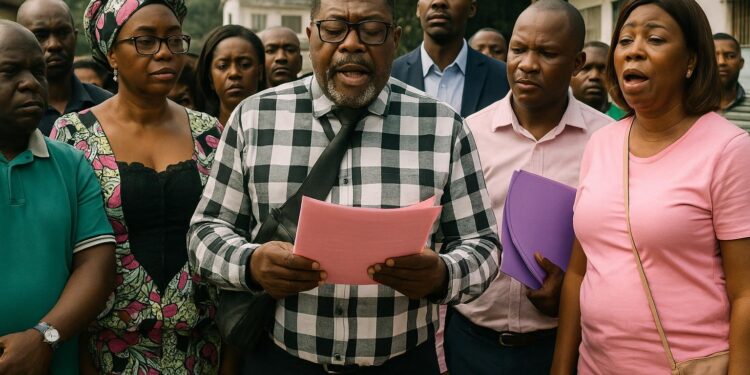Staff weigh sit-in over arrears
Postal workers in Brazzaville are weighing a sit-in after an extraordinary general assembly of the SOPECO inter-union on 7 October put salary arrears and workplace conditions back at the centre of debate.
The meeting underscored that more than fifty months of unpaid wages have accumulated in seven years, pushing staff to consider stronger collective action while reiterating their preference for dialogue with management.
The wage backlog at the heart of talks
Union spokespeople argue that irregular disbursements jeopardise not only household budgets but also SOPECO’s capacity to retain talent in a competitive logistics landscape increasingly shaped by digital platforms and mobile money.
They cite the delayed payment of the March and April 2025 payroll, finally cleared only in August of that year, as evidence that internal cashflow forecasting needs urgent recalibration.
Operational challenges hamper service quality
Beyond remuneration, unionists list a dilapidated vehicle fleet, worn furniture and ageing sorting equipment, warning that these weaknesses restrict service coverage in rural departments and hinder the rollout of the government’s cash-lite agenda.
Obsolete tools, the inter-union says, can also erode customer confidence at a time when private couriers are courting e-commerce platforms eager for last-mile reliability.
Management position and governance context
SOPECO management, while not publicly disputing the arrears, highlights that the enterprise operates in a constrained macroeconomic environment marked by currency volatility and the lingering revenue impact of the pandemic on mail volumes.
Executives emphasise ongoing talks with supervisory ministries to secure bridging finance and to accelerate audit-driven reforms, including a phased upgrade of the vehicle pool.
According to internal notes shared with staff, management also proposes a performance-based bonus scheme linked to the expansion of the electronic stamp, a measure intended to stabilise cash inflows.
Reclassification dispute and legal backdrop
Another sticking point is the annulment of what unions label arbitrary reclassifications that allegedly benefited a narrow circle of employees.
Labour jurists contacted by the inter-union argue that Congolese labour law requires transparent grading based on merit and seniority, leaving room for consensual review rather than confrontation.
The workforce insists that a quick restart of the January 2023 protocol negotiations would create an institutional setting to revisit classification, salary sequencing and social benefits without derailing daily operations.
Strategic importance of the postal bank
Unions also want a career post officer appointed as secretary-general of the Banque Postale du Congo, in which SOPECO owns 20%, citing the need to safeguard synergies between retail banking and the national postal network.
Sector analysts note that deeper integration between parcel logistics and low-cost banking could expand financial inclusion, especially in semi-urban corridors where private banks hesitate to deploy branches.
Toward a negotiated exit to the crisis
For now workers have mandated their bureau to prepare a sit-in but allow room for suspension should concrete proposals emerge, a stance that keeps channels open and aligns with the government’s wider ambition to preserve social stability in strategic state-owned enterprises.
Observers expect that any settlement will blend phased salary clearance with targeted capital expenditure, likely supported by the Finance Ministry’s ongoing public-enterprise reform programme and multilateral technical assistance.
Digital transformation as long-term lever
SOPECO’s electronic stamp project, though still embryonic, is viewed by industry consultants as a potential anchor for diversified revenue streams, from online tax payments to identity verification services, mirroring models piloted successfully in North Africa.
Management believes that once legacy salary obligations are brought under control, it can redirect cash toward a cloud-based sorting platform, enabling real-time tracking and reducing fraud, an upgrade expected to improve the enterprise valuation ahead of any future capital raise.
Regional market pressures
Neighbouring postal administrations, particularly in Gabon and Cameroon, have ramped up partnerships with fintech start-ups, intensifying competitive pressure along the Pointe-Noire–Douala corridor where cross-border e-commerce volumes are growing fastest.
Stakeholders warn that prolonged labour disputes could grant regional rivals a head start, but they also note that no operator in Central Africa matches Congo’s geographic reach across inland river routes, a comparative advantage policymakers are keen to protect.
Investor watchpoints
Credit analysts following state-owned enterprises see transparent resolution of SOPECO’s payroll backlog as a bellwether for broader reforms in Congo’s parastatal portfolio, which accounts for a material share of contingent liabilities on the sovereign balance sheet.
Some investors point to recent improvements in fiscal transparency, including the adoption of programme-based budgeting, as signs that the authorities will support a responsibly sequenced solution that avoids sudden liquidity shocks.
Next milestones on the negotiation calendar
Union negotiators intend to submit a formal platform of demands to the Ministry of Posts, Telecommunications and Digital Economy within ten working days, triggering the statutory conciliation procedure that precedes any industrial action under Congolese labour code.
Should consensus emerge, parties are expected to sign an addendum to the 2023 protocol, detailing a debt-clearance timetable, investment plan and governance benchmarks, an outcome that observers believe could boost stakeholder confidence without interrupting essential postal services.
Shared commitment to continuity
Both sides stress the post office’s enduring role in cohesion.












































